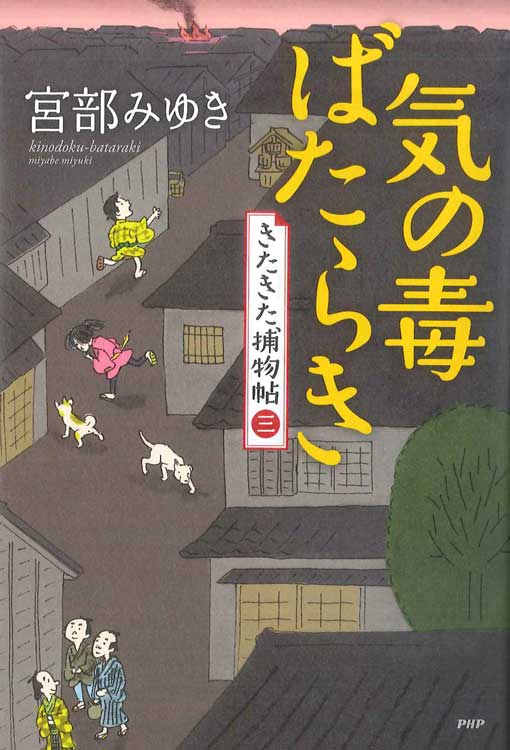[296th] Michiko Mamuro's bookshelf "Kindness and the Detective Stories (3)" by Miyuki Miyabe / PHP Institute
Known as the "original charismatic bookseller," DAIKANYAMA TSUTAYA BOOKS, who recommends books in a variety of media including magazines and TV.
In this series, we take a peek into the "bookshelves" in the mind of our most popular concierge.
Please enjoy it along with his comments.
* * * * * * * *
"The Poor Detective Story (3)"
Miyabe Miyuki/PHP Institute
Click on the image to go to the purchase page.
Click on the image to go to the purchase page.
* * * * * * * *
The third Edo mystery by Miyabe Miyuki.
In many detective stories, the standard premise is that if the perpetrator of an unsolved case is caught, the people involved will feel relieved. Investigators work hard to achieve that goal. However, in this book,
Kitaichi, 16, was the lowest of the low among the underlings of the late boss Senkichi, a police inspector who died suddenly. He makes a living selling paperbacks (cardboard boxes) while frequenting the late boss's wife's house. The wife is blind, but has excellent hearing, nose, and memory. In this third book in the series, the two join forces to solve mysteries, and some have begun to think that Kitaichi "has taken over from boss Senkichi?"
Of course, Kitaichi, who lives in the lower reaches of the family, had no such intentions. However, he begins to be seen as a successor not only by his neighbors but also by people in the upper classes, and as he solves a number of mysteries, he begins to feel a sense of pride. In the second story of this book, "The Haunted House," Kitaichi tries to get involved in the case of the rental bookstore owner, Murata Jihei, which was briefly mentioned in the previous work, "The Child-Treasure Ship: The Detective Story (2)."
As the story progresses, Kitaichi has even managed to get his own paperback factory on the outskirts of Fukagawa. Then, Jihei, the owner of the rental book store Murataya, who was in the previous story, comes up with the idea of selling books in sets with boxes. But it is Grandpa Suezou, the head of the paperback factory, who puts a stop to this idea.
Jihei's newly married wife Otoyo was spirited away 28 years ago and later found dead. Grandpa Suezou has a dislike for the Murataya family, saying, "If something like this has happened twice close to me, then they must be sinful people." The incident was left unsolved.
Speaking of a walking dictionary of Edo in Miyabe's works, this man is Odeko-san! He also appears in this book. Kitaichi visits him and finds out the details (Odeko knows everything!). He then shares his thoughts: "If we can just find out what happened to Jihei-san's wife and who the culprit is, maybe we can ease Suezou's dislike of Murataya." But Odeko says, "It won't turn out the way Kitaichi expects."
I was impressed by how Odeko-san (Miyabe-sensei) read people's feelings. And I thought. In fact, this is what has always been happening in our reality, behind the wonderful "everyone feels relieved when the real culprit is arrested" of detective dramas and mystery stories. I dug deeper into what Odeko-san said.
It's a common occurrence both online and in real life that even after an acquittal, people continue to suspect someone once they have concluded, "Even so, that person was suspicious, so there must have been something."
There are also cases where people blame themselves. Otoyo's parents were one example. They were obsessed with the idea that their daughter had become like that because of their own arrogance or negligence.
Suezou, who dislikes Jihei, and Otoyo's parents, who constantly criticized him, are fundamentally the same. If we don't find some reason for it, this world will become one in which "a young, happy girl can just be killed." That goes beyond "painful" to "scary." It's frightening to live in a world where such mercilessness is rampant.
And Suezou is already old. If he realizes that he was wrong to have continued to avoid Murataya Jihei, his 28 years will fall apart. So even if Kitaichi solves the case and tells him "this is the truth," he won't change his mind. For the sake of his own peace of mind, both in the past and in the future.
What we should pay attention to here is that Grandpa Suezou is not a twisted person. There are many such examples in the Reiwa era. How similar are the old people of the Edo period and us in the modern information society?
In my home in Otoko, which was like a book storehouse, I was filled with the same helplessness that Kitaichi felt. There were countless books and documents, and they were filled with the wisdom of the past, so why was it that there were still things in this world that we could not overcome? Can't we overcome life with books?
And I think, even so, it is books that teach us that there are still some things that we cannot control.
Although the story is set in the Edo period, it is a work that delves into the present, and it is significant that Miyabe-sensei is writing period novels as well as modern mysteries.
In many detective stories, the standard premise is that if the perpetrator of an unsolved case is caught, the people involved will feel relieved. Investigators work hard to achieve that goal. However, in this book,
Kitaichi, 16, was the lowest of the low among the underlings of the late boss Senkichi, a police inspector who died suddenly. He makes a living selling paperbacks (cardboard boxes) while frequenting the late boss's wife's house. The wife is blind, but has excellent hearing, nose, and memory. In this third book in the series, the two join forces to solve mysteries, and some have begun to think that Kitaichi "has taken over from boss Senkichi?"
Of course, Kitaichi, who lives in the lower reaches of the family, had no such intentions. However, he begins to be seen as a successor not only by his neighbors but also by people in the upper classes, and as he solves a number of mysteries, he begins to feel a sense of pride. In the second story of this book, "The Haunted House," Kitaichi tries to get involved in the case of the rental bookstore owner, Murata Jihei, which was briefly mentioned in the previous work, "The Child-Treasure Ship: The Detective Story (2)."
As the story progresses, Kitaichi has even managed to get his own paperback factory on the outskirts of Fukagawa. Then, Jihei, the owner of the rental book store Murataya, who was in the previous story, comes up with the idea of selling books in sets with boxes. But it is Grandpa Suezou, the head of the paperback factory, who puts a stop to this idea.
Jihei's newly married wife Otoyo was spirited away 28 years ago and later found dead. Grandpa Suezou has a dislike for the Murataya family, saying, "If something like this has happened twice close to me, then they must be sinful people." The incident was left unsolved.
Speaking of a walking dictionary of Edo in Miyabe's works, this man is Odeko-san! He also appears in this book. Kitaichi visits him and finds out the details (Odeko knows everything!). He then shares his thoughts: "If we can just find out what happened to Jihei-san's wife and who the culprit is, maybe we can ease Suezou's dislike of Murataya." But Odeko says, "It won't turn out the way Kitaichi expects."
I was impressed by how Odeko-san (Miyabe-sensei) read people's feelings. And I thought. In fact, this is what has always been happening in our reality, behind the wonderful "everyone feels relieved when the real culprit is arrested" of detective dramas and mystery stories. I dug deeper into what Odeko-san said.
It's a common occurrence both online and in real life that even after an acquittal, people continue to suspect someone once they have concluded, "Even so, that person was suspicious, so there must have been something."
There are also cases where people blame themselves. Otoyo's parents were one example. They were obsessed with the idea that their daughter had become like that because of their own arrogance or negligence.
Suezou, who dislikes Jihei, and Otoyo's parents, who constantly criticized him, are fundamentally the same. If we don't find some reason for it, this world will become one in which "a young, happy girl can just be killed." That goes beyond "painful" to "scary." It's frightening to live in a world where such mercilessness is rampant.
And Suezou is already old. If he realizes that he was wrong to have continued to avoid Murataya Jihei, his 28 years will fall apart. So even if Kitaichi solves the case and tells him "this is the truth," he won't change his mind. For the sake of his own peace of mind, both in the past and in the future.
What we should pay attention to here is that Grandpa Suezou is not a twisted person. There are many such examples in the Reiwa era. How similar are the old people of the Edo period and us in the modern information society?
In my home in Otoko, which was like a book storehouse, I was filled with the same helplessness that Kitaichi felt. There were countless books and documents, and they were filled with the wisdom of the past, so why was it that there were still things in this world that we could not overcome? Can't we overcome life with books?
And I think, even so, it is books that teach us that there are still some things that we cannot control.
Although the story is set in the Edo period, it is a work that delves into the present, and it is significant that Miyabe-sensei is writing period novels as well as modern mysteries.
* * * * * * * *
(Redirects to Yahoo! Shopping)

DAIKANYAMA TSUTAYA BOOKS Literature Concierge
Michiko Mamuro
【profile】
"The original charismatic bookseller" who recommends books on various media such as radio and TV. Has serials in magazines such as "Precious" and "Fino". Active as a book critic, his paperback reviews include "The Pale Horse" (Agatha Christie/Hayakawa Christie Bunko), "Motherhood" (Minato Kanae/Shincho Bunko), "The Snake Moon" (Sakuragi Shino/Futaba Bunko), and "Staph" (Michio Shusuke/Bunshun Bunko).
























